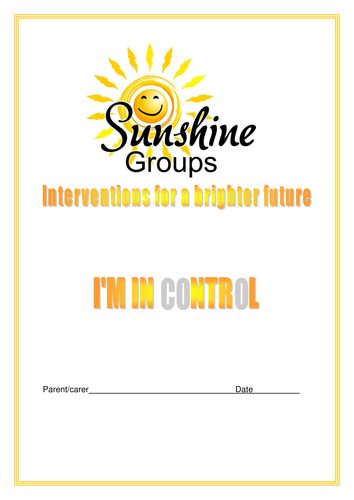


This course is designed for those students who struggle to control their emotions, their outbursts and their anger. It is about controlling emotions, which adversely affect the child, how do they react to particular situations? Do they have a cycle of destructive behaviour which they need help changing? Structured so that they are presented with examples of particular scenarios, then asked to work out the best responses to them. Basically we are looking to alter their automatic responses and replace them with more positive reactions to life’s events.
PARENTAL NOTES
This is a straight forward programme on the one hand, a child with obvious anger issues, but in order that they don’t live with that label or indeed live up to that label it is a difficult programme. There are obviously references to anger, but I have tried to envelop it into different issues and aspects of life so that it is more oblique and everything isn’t geared up around just anger. There are many facets to the programme and the development of the child through it.
WHY THIS INTERVENTION
Does your child exhibit any of the following behaviours? (Some may not be connected to the issues within the family or they may be, children often use different coping methods when faced with difficult ties)
Out bursts at staff or pupils at school
Outbursts involving injury to themselves (punching doors, glass etc)
Emotional outbursts at odds with the situation
Destructive behavior at home
Challenging adults
Angry threatening outbursts
Tears and remorse after ‘events’
LENGTH OF INTERVENTION
The sessions are divided into roughly one hour x 6 weeks, plus follow up session, however, depending on the age and concentration level of your child you could split the sessions further. Each session will have 3 or 4 worksheets to complete.
BASIC OVERVIEW OF THE INTERVENTION SESSIONS
!. In control? This session looks at where they are now at the beginning of the intervention, how do they feel about themselves and their issues?
2. Whose looking at me? Looking at different perspectives of their personality; considering attitudes and feelings about anger in particular.
3. Cycles of events This session looks at their cycle of behaviour, how it normally happens and what patterns there are.
4. I’ve done it again. Acknowledging and admitting to their feelings and failings, in order to move forward with positive change
5. Different perspectives Looking at changing and the perspective, scenarios and reframing; considering different ways to look at the same situation
6. Plans This session considers how a more in control student may look, making
PARENTAL NOTES
This is a straight forward programme on the one hand, a child with obvious anger issues, but in order that they don’t live with that label or indeed live up to that label it is a difficult programme. There are obviously references to anger, but I have tried to envelop it into different issues and aspects of life so that it is more oblique and everything isn’t geared up around just anger. There are many facets to the programme and the development of the child through it.
WHY THIS INTERVENTION
Does your child exhibit any of the following behaviours? (Some may not be connected to the issues within the family or they may be, children often use different coping methods when faced with difficult ties)
Out bursts at staff or pupils at school
Outbursts involving injury to themselves (punching doors, glass etc)
Emotional outbursts at odds with the situation
Destructive behavior at home
Challenging adults
Angry threatening outbursts
Tears and remorse after ‘events’
LENGTH OF INTERVENTION
The sessions are divided into roughly one hour x 6 weeks, plus follow up session, however, depending on the age and concentration level of your child you could split the sessions further. Each session will have 3 or 4 worksheets to complete.
BASIC OVERVIEW OF THE INTERVENTION SESSIONS
!. In control? This session looks at where they are now at the beginning of the intervention, how do they feel about themselves and their issues?
2. Whose looking at me? Looking at different perspectives of their personality; considering attitudes and feelings about anger in particular.
3. Cycles of events This session looks at their cycle of behaviour, how it normally happens and what patterns there are.
4. I’ve done it again. Acknowledging and admitting to their feelings and failings, in order to move forward with positive change
5. Different perspectives Looking at changing and the perspective, scenarios and reframing; considering different ways to look at the same situation
6. Plans This session considers how a more in control student may look, making
Something went wrong, please try again later.
This resource hasn't been reviewed yet
To ensure quality for our reviews, only customers who have purchased this resource can review it
Report this resourceto let us know if it violates our terms and conditions.
Our customer service team will review your report and will be in touch.
£10.00